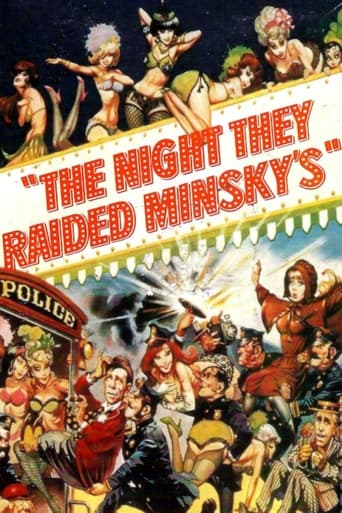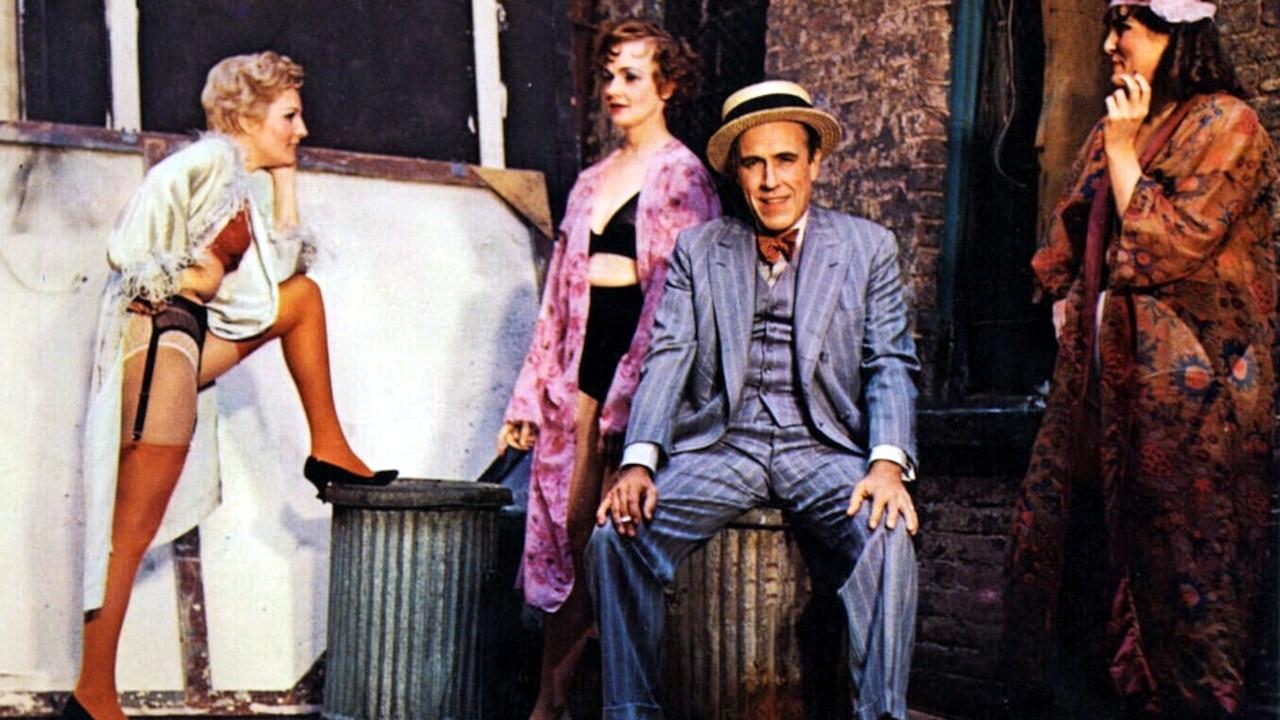DKosty123
Based on a true story, this movie brings off some very unusual things. For example, Jason Robards is not a person you'd expect to bring off the role of a straight man in Vaudeville. While you can tell he is not comfortable in the role, he does more than a walk through in this one. Britt Ekland is in no way an Amish Woman. Who decided to cast her as one is strange. The thing is because she is good looking she fits the story. Elliot Gould is young here without much script so it is one of his lesser roles. He does OK with it. Forrest Tucker is a nice surprise though another limited role. Bert Lahr has a role as Professor Spats which resembles the emcee in Cabaret and considering he looks ill in most of his scenes he is better here than it is reasonable to expect.I think if this had been released in the 1950's it would have sold a lot of tickets. The trouble with 1968 is this type of film was DOA in that era. Even Julie Andrews expensive production "Star" did nothing in this time period. In a way Minsky's actually is better. It does a decent job giving a feel of what Vaudeville was really like.
edwagreen
Asinine film where an Amish girl comes to New York to do biblical dancing and winds up at Minsky's Burlesque instead. She is put to the test so that her bible dancing will not lead to a raid; yet, her father shows up and has it out with her causing her to literally bare all.This is a very inane production with a ridiculous plot. Unfortunately, Bert Lahr's part had to be cut as he died suddenly during the production of the film.Jason Robards tries real hard as a king-pin of burlesque, but he is no leading man and his routines are quite stale at best.Britt Ekland is that Amish girl, Elliot Gould runs the club, but is at odds with his orthodox Jewish father, Joseph Wiseman.What's really the point of this total farce?
jzappa
Just a mere coffee break before William Friedkin made an almost consecutive string of such searing naturalistic dramas as The Boys in the Band, The French Connection, The Exorcist and Sorcerer, he showed up with The Night They Raided Minsky's, a low-brow farce which belongs in the pantheon of other throwback vaudevillian screwball romps from the Technicolor 1960s and early '70s, as in Take the Money and Run, the Pink Panther films, What's New Pussycat, It's a Mad Mad Mad Mad World, Bananas and What's Up, Doc? It shares the lagging sense of pace that some of them do---cursing those with one major inferiority to the 1930s and '40s pictures they embrace---as well as the urge to take what could be effective scenes and mash them into clunky montages. It also cannot remotely compare to What's Up, Doc?, the crowning achievement of this trend of the era helmed by Friedkin's New Hollywood rival Peter Bogdanovich. But The Night They Raided Minsky's is not without a secure handling of its risqué content by a director who was hungry for big risks in a period of American cinema where progress was entirely fueled by them.Instrumental in the commercial transformation of Hollywood in only a few short years, Friedkin's films often display a cold cynicism which belies the popular appeal of his future short-lived commercial success. The Night They Raided Minsky's is of a completely different spirit. It is a star-studded ensemble farce, fueled not so much by the breathtaking nature of any scene or story point but by the archetypal bearings of its performers. We have Elliott Gould delightfully playing up his deeply recognized Jewish identity, Denholm Elliott lovingly drawing from his always readily apparent English manners, Jason Robards working his all-American common-man staple. But whether stand-alone scenes work in and of themselves or not, the movie altogether truly appears to grasp this most-American art form.Supposedly, burlesque surged in an era when America was at the onset of the modern moral uprising, when the rural Puritan standards and the makeshift culture of the cities came across one another. Burlesque was basically vaudeville and sex, and in the early days the sex was straightforward, guileless and practically inoffensive. This is the charm of this film, not the pratfalls, the jokes or the farce, even when they work well, which is where Friedkin's stamp really shows itself: Like a Friedkin picture, it is about more than it acts like it is. Friedkin recounts that very period, when there was an exhilaration and flourishing, boisterous burlesque that later vanished. His characters live a talkative, communal life, occupying cafeterias and eating outlandish, hysterically filmed meals. They view burlesque not so much as a profession, more a lifestyle.The plot involves a young Amish girl played by Swedish future Bond doll Britt Ekland, who comes to the big city and is overwhelmed by the flashing marquees. The film opens with Rudy Vallee telling us in a vaudeville style that what we're about to see is based on "really true incidents that actually happened," that "in 1925 there was this real religious girl
this real religious girl." Black-and-white images of Model A's on hectic streets, a dancing horse, acrobats, and numerous other impressions whip by, ultimately beholding a lively market street teeming with peddlers and pushcarts that bursts into color. There's a close-up on Ekland riding in bright-eyed on an el train. Her point-of-view peering out at the tenement-lined street erupts from black-and-white to color, as does her making her way down that street. She imbibes the zest and ambiance of a novel world, swarming but exhilarating. Austere gray skies but a vividm multihued event interspersed by more color swings visually signifying her inexperience.Friedkin captures her coming in his naturalistic style of pursuing and exposing action. Her discovery of countless faces, vendors, merchants and ultimately the Minky's Burlesque Theater, is our discovery, too. We become partakers rather than just watchers. And the awareness to minutiae webs with our point-of-view on the marquee dropping to show Bert Lahr chomping a cigar, about to befriend the virginal greenhorn whose perspective we've shared.She longs to dance at Minsky's. She is fought over by two comics (Norman Wisdom and Jason Robards), bird-dogged by her bearded, religious zealot father, and she suddenly, unwittingly and yet glamorously pioneers the striptease. And that moment when she finally invents the strip dance mostly to defy her father and other possessive male figures speaks so many volumes about the futility of utter conservatism and fundamentalism, how the more it pushes and the more it engulfs, the more shocking and extreme each explosion of rebellion and revolution will be, which of course is not to say that the scene itself threatens anything over PG-13 material, but the subtext is there.Friedkin has intentionally employed stereotypes in casting. Ekland is as dovelike and guileless as Joan of Arc and her father is an emigrant from an Early Renaissance allegorical drama. So the story itself takes on some of the reduction and directness of the burlesque skits which freely exposes the action, which tends to compensate for the film's weakness since the editing often becomes a bit too unnecessarily frenzied rather than gazing decisively on the impact of a given image or scene.
Tom Murray
Why doesn't everybody just love this movie? It is one of most delightful comedies that I have ever seen. I saw it when it first came out in the cinema and watched it three times that first week and at least four times since.It is a very stylized movie, with an introductory narration right out of the 1920's. The style carries right through the film, with wonderful vaudeville routines. The "girls" are not particularly beautiful and are, by current standards a little overweight. Also they seem to be going through the motions with a variety of personalities. They do not have beautiful singing voices and they do not dance in perfect synchronization but nobody, especially them, seems to care. Burlesque is, after all, light entertainment. The comedy skits are very simple and unintelligent but they are performed with great panache. Sir Norman Wisdom (born 1915), the great British stage and screen clown of the Charlie Chaplin ilk, and Jason Robards Jr., the dapper Oscar-winning, American actor of the classic stage are the two central male characters and are both attracted to the beautiful Amish girl who has left home to dance stories from the Bible on stage. Wisdom is a master clown and can move in ways that are magically humorous. Burlesque has two meanings, with two spellings: - a humorous and provocative stage show featuring slapstick humour, comic skits, bawdy songs, striptease acts, and a scantily clad female chorus. (Burlesk) - an artistic composition, especially literary or dramatic, that, for the sake of laughter, vulgarizes lofty material or treats ordinary material with mock dignity. (Burlesque) The movie is a burlesque about burlesk. It also makes fun of religion, stage performances, censorship, prudery, friendship, business, fraud, crime, police, audience intelligence, class distinction, love, seduction, hypocrisy, etc. The mood is intense from start to finish, with several collages of scenes from the past and the movie's present. When I was not laughing out loud, I was laughing inside. The comedy on the stage is very elementary but the comedy in the story is often quite subtle and intelligent. Back to the initial question — I think that the movie may be too stylized for many people to enjoy, especially since the style has long been almost extinct. But if one accepts the style and allows oneself to become immersed in it and flow with it, the movie can be great.


 AD
AD




